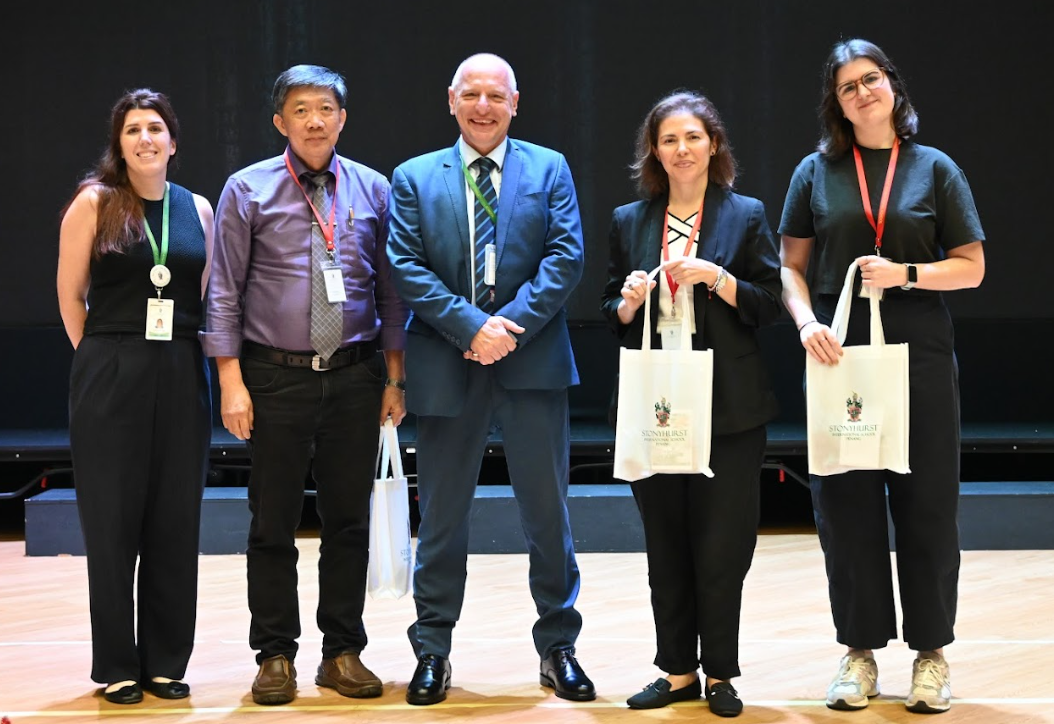Name: Rebecca Naughton
Country of Origin: United States of America
Name of School: International School of Kuala Lumpur
Year(s) and Subject(s) Taught: IB Psychology, IB Economics, IB History, IB Business, World History, Civics, Sociology, AP Economics, AP Psychology, AP History (Grades 9-11)
How long have you been teaching? 18 years
Why did you become a teacher? Why did you choose teaching as a profession?
I can't remember a time I didn't want to be a teacher. Growing up, I always played "school" with my cousins. I had a fantastic teacher in High School, Mr. Duffer, for History. He allowed me to learn from him while still in high school, preparing lessons. I always wanted to share the love of learning that I had.
Tell us about your education journey (where did you study to become a teacher?).
I went to do my undergraduate degree at Eastern Illinois University, studying Social Science, then went to Roosevelt University for a Master's in Economics. I then attended Olivet Nazarene University for a Master's in Education Administration and then went to Augustana College for Curriculum and Instruction, and finally, I received my Ph.D. in Higher Education from Capella University.
What is the most memorable moment in your teaching career so far?
This is a tough one! I think there are always memorable moments each semester, and mainly they are about a student finding something they love to know more about. Or a student who was once not engaged with the material, finally becoming engaged with the material. While working in Chicago, I had the chance to mentor many students who were the first in their families to finish high school or had children of their own and still finished high school successfully. I also helped students become the first in their families to attend university. Any moment where I can be a part of a student's next step for their future is considered memorable to me. Whether it is talking with them as they figure out their major, which university to attend, how to spend a gap year, or what line of service to go in, all of these are memorable conversations. Watching students gain confidence and come into their own where they find their own journey and path is what always stands out for me. The ones that help me remember the job are more than just the material I am teaching.
What do you like most about teaching?
The best part about teaching are those memorable conversations with students. Helping others find their true passion or see their true potential and teaching them that they are more than just a grade and that we all can make this world just a little bit better by our actions.
What is the best thing about teaching at your school?
The best thing about ISKL are the students. They are open to new ideas and new challenges. They are hardworking. They are ethical and want to know more about the world and what they can do to help make it better. They don't give up when they meet an obstacle; they find ways around, over, or through it. They see what they are good at, what they are interested in, and what they want to be a part of. The school itself helps to foster this with its great campus, the incredible offerings of all the extracurricular activities, clubs, volunteering opportunities, sports, and the wide variety of classes that are taught. If it doesn't exist at the school already, the students can start it up. Students can fully commit to being all they are with everything that the school offers.
Who or what inspires you?
So many people come to mind! Currently, as the Olympics are on, I am in awe of Simone Biles, not just for her incredible athletic ability, but more so now for her saying no to competing to take care of herself. It is truly inspiring to see someone be a role model, not just in their field, but also to say mental health is essential. By acknowledging what so many others are dealing with, it permits them to do the same. As psychology teachers, we discuss mental health a lot, and still find that it is considered a taboo topic (to talk about). Others like her are inspiring in the same way, where it doesn't have to be a big thing; it can just show people there are lots of paths that one can take and still be a good, successful person.
Tell us about your online teaching experience. Did you face any challenges?
Online teaching was different and challenging because I wanted to find ways to let each student know I was there for them throughout these tough times. In-person, there are lots of times during the day when I can have one-on-one conversations, or check-ins with the students, to let them know that they are seen and heard as humans. Online, this is a whole different case, and not just about the conversations with me, but the conversations that existed before class, after class, and sometimes during class, that allowed for human connection. I started using Kumospace at the end of the year after being introduced to it in a meeting by our Curriculum Coordinator (thanks, Tanya!), and this allowed space for students to have organic, essential conversations with me, or with their classmates.
What is one thing you would like all students to know?
I want all students to know that they can do so much more than they think and that hard work and making mistakes are all part of the process. That's where the learning happens, whether in class or after graduation, while at work, or in their personal lives. Don't shy away from challenges because you are scared of not succeeding.
Any advice that you would like to give to students?
I always tell my students to make good choices and to make exciting choices. I want them to know that it is alright to try and fail and then try again or try something new. I want them to know that they are more than their mistakes, and their mistakes make them stronger. I want them to put themselves out there; great things come from some discomfort. I want them to always have the perspective of what they have and what others do not have and to help whenever they can. I want them to take care of themselves, as well as others.













![[elc International School] NO SHORTCUTS: WHY THINKING STILL MATTERS](https://mint-edm.sgp1.digitaloceanspaces.com/production/XTvbqZxxQQxUHjyDcClxCortA5SxNs.png)




















